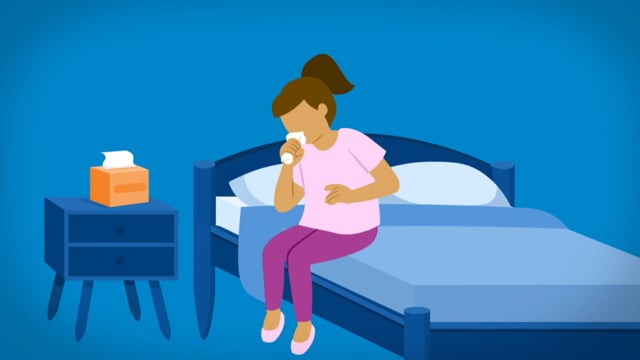What Is Rotavirus?
Rotavirus is a common cause of gastroenteritis, often called stomach flu. The virus infects the stomach and intestines. It causes vomiting and diarrhea, especially in babies and young children. Infections are common during the winter and spring months, especially in childcare centers.
The rotavirus immunization is recommended for most infants. It can help prevent rotavirus infections.
What Are the Signs & Symptoms of Rotavirus?
Kids with a rotavirus (ROE-tuh-vy-rus) infection have:
They also might have a cough and runny nose. As with all viruses, though, some rotavirus infections cause few or no symptoms, especially in adults.
Sometimes the diarrhea is so bad that it can quickly lead to dehydration (not enough water in the body). A child who's dehydrated might:
- be thirsty
- be cranky
- be very tired or less alert
- feel dizzy or lightheaded
- have sunken eyes
- have a dry mouth and tongue
- have a sunken soft spot (fontanelle) in a baby
- pee less often or have fewer diapers than usual
Is Rotavirus Contagious?
The virus is in the stool (poop) of infected people and spreads easily. Kids can get infected when they put their fingers in their mouths after touching a contaminated surface, like a toy. Usually this happens when kids don't wash their hands, especially before eating and after using the toilet.
People who care for kids, including health care and childcare workers, can spread the virus, especially if they don't wash their hands after changing diapers. Kids can also get sick if they eat food or drink water with the virus in it. This happens when a person with rotavirus does not wash their hands before preparing food.
How Is Rotavirus Diagnosed?
Doctors usually can tell if someone has stomach flu by hearing about the symptoms. Usually, no tests are needed. If a child is very sick or has blood or mucus in their poop, doctors might order a stool (poop) test to check for rotavirus and other germs that cause diarrhea. The doctor may also order a urine (pee) test or blood test to check for dehydration.
How Is Rotavirus Treated?
Babies and toddlers who are dehydrated may need treatment in a hospital. They'll get intravenous (IV) fluids to bring the body's fluid and salt levels back to normal. Most older kids can be treated at home.
Home Treatment
Kids with diarrhea who aren’t vomiting can continue eating and drinking as usual, if they are feeling up to it. They should drink plenty of fluids to prevent dehydration. Those with mild dehydration should:
- Drink small amounts of an oral rehydration solution (such are Pedialyte, Enfalyte, or a store brand) often. It has the right amount of water, sugar, and salt to help with dehydration. You can buy it without a prescription at drugstores or supermarkets.
- Avoid full-strength (undiluted) fruit juices, soda, and sports drinks, which can make diarrhea worse.
- Continue to breastfeed or take formula, as long as they are not vomiting a lot.
As your child starts to feel better, you can give less oral rehydration solution and more of their usual food and drink.
Don't give your child over-the-counter medicines for vomiting or diarrhea unless your doctor recommends them.
Can Rotavirus Be Prevented?
The rotavirus vaccine can help prevent rotavirus. It’s a liquid given by mouth to babies at ages 2 and 4 months, and again at 6 months, depending on the vaccine brand.
Washing hands well and often, especially after using the bathroom and before preparing or eating food, is the best way to prevent rotavirus infection. Kids with rotavirus should stay home from childcare until the diarrhea is gone.
When Should I Call the Doctor?
Call the doctor if you think child may have of a rotavirus infection. Call right away if your child:
- can’t drink for several hours
- is peeing less often than usual
- has signs of dehydration, such as crying with few or no tears, having a dry mouth or cracked lips, feeling dizzy or lightheaded, acting very sleepy or less alert
- has a high fever
- has blood in their poop or vomit
- is vomiting for more than 24 hours or diarrhea is not getting better after several days
-

Does my child need an antibiotic?
Find out if antibiotic medicines will help your child feel better – or if some TLC is all that’s needed.


